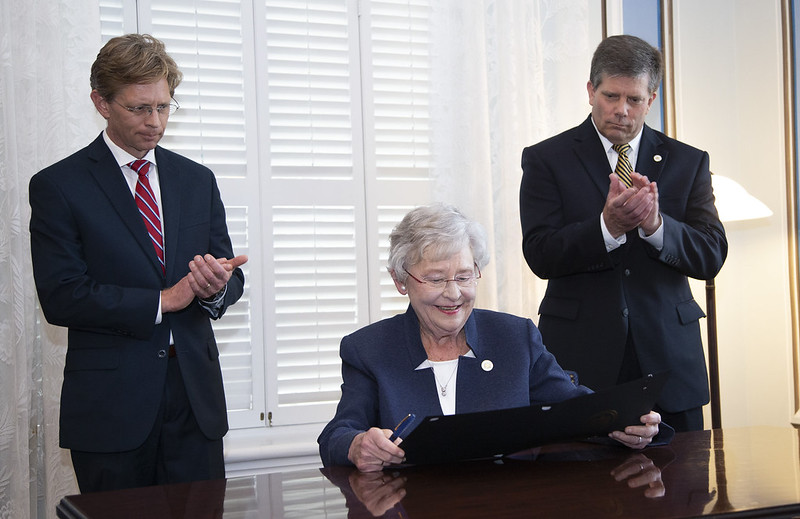Governor Ivey Announces Alabama Sentry Program to Train Administrators in School Security

MONTGOMERY – Governor Kay Ivey on Wednesday announced the Alabama Sentry Program which provides for an additional security measure in schools that do not have a School Resource Officer (SRO).
The Alabama Sentry Program is a voluntary program which will permit administrators in schools, without an SRO, to maintain a firearm on campus in a secured safe in order to be prepared to respond to an active shooter situation. The Sentry Program will require that the administrator successfully complete training created and certified by the Alabama Law Enforcement Agency (ALEA). Unlike teachers, school administrators have complete access to their schools and are responsible for the safety of all students at the school, not an individual classroom.
“The Governor’s SAFE Council recommended adding more School Resource Officers throughout our state, a solution that I support, and will work with the legislature to implement. However, until we have a concrete plan to increase the number of SROs, we must provide a way for schools to protect their students in the upcoming school year. I have created the Alabama Sentry Program to provide additional security measures for our children, and to utilize the current summer break to train those who volunteer to be a sentry,” Governor Ivey said. “The Alabama Sentry plan is a reasonable and measured approach to provide an additional tool for schools without a resource officer. With the unfortunate continued occurrence of school violence across our country, we cannot afford to wait until the next legislative session.”
The Sentry Program will be established immediately, through administrative action, under existing law. The Alabama State Department of Education (ALSDE) and ALEA, acting through the Governor’s Securing Alabama’s Facilities of Education (SAFE) Council, will develop a memorandum of understanding, implementation regulations, and guidance to participants. ALEA and ALSDE will establish guidelines for training requirements, stress tests, mental-health evaluations, and drug screenings.
Joining Governor Ivey for the announcement were Alabama Secretary of Law Enforcement Hal Taylor and Dr. Eric Mackey, Alabama Superintendent of Education.
“I believe this is a common-sense approach to increasing security in our schools. The SAFE Council worked hard with officials from around the state to create a list of recommendations. I applaud Governor Ivey and members of the SAFE Council for creating this program,” Secretary Taylor said. “School security is one of the highest priorities for law enforcement and this program will help first responders identify and stop threats quicker and before they happen.”
“Schools are sanctuaries of learning and, as such, they must be safe places for our children to learn, knowing that the adults around them are watching out for their safety and security. With recent events around our country, now is the time to act,” Dr. Mackey said. “The Alabama Sentry Program is one way for us to put more safety resources in schools without having to seek new funding. This is truly a step in the right direction. I look forward to working with Secretary Taylor and the entire SAFE Council to implement this program.”
A school administrator must seek the approval of their local superintendent, local school board, and county sheriff to participate in the Sentry Program. School administrators seeking to assume the duties of school sentry must possess a valid Alabama school administrator certificate and a valid concealed-carry pistol permit; must be appointed as a reserve sheriff’s deputy; must be an active school administrator in a public elementary or secondary school without an SRO; and must pass a drug screening, a mental-health assessment, and a stress test. Sentries will be subject to random drug screenings, annual training, mental-health, and stress test recertification.
A school sentry’s duties will be written to include “the use of lethal force to defend the students, faculty, staff, and visitors of his or her school from the threat of imminent bodily harm or death by an armed intruder.” School sentries shall only exercise their duties in response to an armed intruder.
School sentries will be required to keep their firearms in a secured weapon storage system. School sentries, or their employing board of education, shall be responsible for acquiring and maintaining a weapons-storage system, an approved weapon, ammunition, and a specially-designed bullet-proof vest.
Today’s announcement of the Alabama Sentry Program comes as part of a sequential process of implementing the recommendations of the SAFE Council. Currently six of the Council’s 10 recommendations have proceeded to implementation, with plans for additional actions forthcoming. Upon review of the Council’s report, Governor Ivey chose to add the Alabama Sentry program as an additional option for schools without an SRO. By announcing the program at the start of the summer break, participating agencies will be able to develop and implement the program, thereby allowing Sentries to begin serving during the upcoming school year.
At the conclusion of the event, Governor Ivey signed an executive memorandum establishing the Alabama Sentry Program and directing the State Department of Education and the Alabama Law Enforcement Agency to implement the program. The Alabama Sheriff’s Association has fully endorsed and supports the Alabama Sentry Program.
###
The Executive Memo can be found here.
Photo Gallery:

Provided by the Office of the Governor of Alabama | governor.alabama.gov

